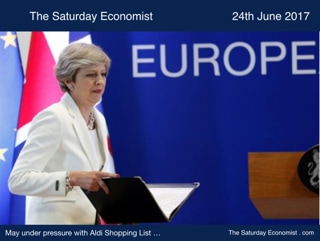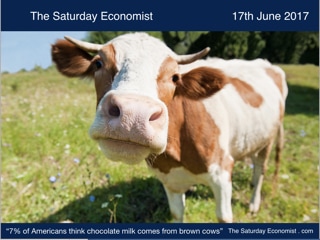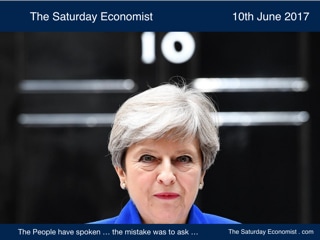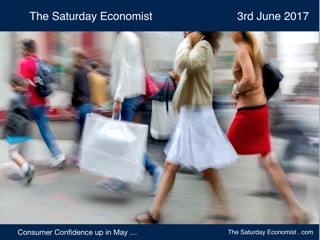 May made the big move on immigration this week. A guarantee of EU citizen rights in the UK - the long awaited concession. It was the beginning of the charm offensive in Europe. Alas, que sera, sera, it was not to be. The Europeans wanted more than the deal on offer. Guy Verhofstadt, the European parliament's negotiator said the offer "failed to fully guarantee rights for citizens, with a lack of clarity on cut off date, family reunification and jurisdiction". No deal! The Tories seem to believe Brexit negotiations simply involve creating a list of conditions on which the UK is prepared to leave the EU. It's a bit like creating an Aldi shopping list. Prepare the clipboard, make the trip, grab a trolley and wander around 27 countries picking up concessions in the meat, fish and veg departments during the round. This was never going to be easy. Davis has already been told the trade deal has to wait the exit settlement. May has demonstrated the lack of preparation and planning ahead of the announcement. Too much trouble to send the draft of the immigration deal ahead, to ensure there would be no difficulty in acceptance. EU citizens rights should be an easy win for both sides. UK businesses need a deal urgently. The EU would like this particular issue agreed. So what's the problem? Perhaps it's judicial jurisdiction and the rôle of the European Court of Justice brought into play. Oh dear ... the shopping list just got a little more complicated. No click and collect on citizen rights just yet ... the Tory back benches have an allergic reaction to the ECJ ... Kristin Forbes ... a hawk leaves the MPC Kristin Forbes is to leave the MPC this month after just one term in office. A hawk among doves, Forbes voted for an increase in rates in March and in June this year. In a speech this week, the MIT Professor talked of the "failure to launch" - the inability of central banks in almost all developed countries to launch interest rates off the emergency levels adopted in response to the financial crisis. "Escape from Planet ZIRP" has been a theme of ours for some time now. Forbes argues the lift off in the UK should not be delayed any longer. Despite fears of the fragility of recovery, consumer debt and the weakness of wage inflation, the time is right to hike rates. The view is in stark contrast with the Governor of the Bank of England, Mark Carney, speaking at the Mansion House this week. "We are all going to be poorer" claimed the Governor as a result of leaving the EU. The Governor is inclined to avoid any rate rise until the Brexit negotiations have been concluded. Does this mean the Article 50 settlement (two years) or the trade deal (another five years?). Forward Guidance now extends into the next parliament and beyond according to the Governor. Can we really expect rates to be on hold if Corbyn is elected? Will rates be on hold if inflation persists, wages accelerate and austerity plans are reversed? Hardly. Indeed this was the view of Andy Haldane, Chief Economist at the Bank of England. In a third speech this week by a member of the MPC, Haldane made it clear he would be considering a rate rise later this year, despite the concerns of the Governor over the medium term. The Governor at the Mansion House, Haldane in Bradford and Kristin Forbes at London Business School on Thursday. Three speeches all with differing views on the future path of monetary policy in the UK. Who said forecasting was easy! LSE's Professor Silvana Tenreyro will join the lineup to replace Forbes on the MPC next month. With British, Italian and Argentinian citizenship, Professor Tenreyro will certainly supply an international perspective. "I think [Brexit] will have a negative impact on the UK economy" Ms Tenreyro told the FT in January. Bearish on a rate rise, we are losing a hawk for a dove, the likely outcome in the latest MPC change ... The week in markets ... The Dow steadied, the FTSE slipped. Sterling weakened against the dollar and the Euro. Yields were largely unchanged. Oil moved lower on news of US output and stock levels. Markets look set for midsummer correction ... John That's all for this week. Have a great week-end ... © 2017 John Ashcroft, Economics, Strategy and Social Media, experience worth sharing. ______________________________________________________________________________________________________________ The material is based upon information which we consider to be reliable but we do not represent that it is accurate or complete and it should not be relied upon as such. We accept no liability for errors, or omissions of opinion or fact. In particular, no reliance should be placed on the comments on trends in financial markets. The receipt of this email should not be construed as the giving of advice relating to finance or investment. ______________________________________________________________________________________________________________ If you do not wish to receive any further Saturday Economist updates, please unsubscribe using the buttons below or drop me an email at [email protected]. If you enjoy the content, why not forward to a friend, they can sign up here ... _______________________________________________________________________________________ For details of our Privacy Policy and our Terms and Conditions check out our main web site. John Ashcroft and Company.com _______________________________________________________________________________________________________________ Copyright © 2017 The Saturday Economist, All rights reserved. You are receiving this email as a member of the Saturday Economist Mailing List or the Dimensions of Strategy List. You may have joined the list from Linkedin, Facebook Google+ or one of the related web sites. Our mailing address is: The Saturday Economist, Tower 12, Spinningfields, Manchester, M3 3BZ, United Kingdom.
0 Comments
 In the U.S.A. seven percent of Americans think chocolate milk comes from brown cows. Yep, according to a survey from the U.S. Dairy Innovation Center, 16.4 million, misinformed, milk-drinking people, the equivalent of the population of Pennsylvania, just don't accept the inclusion of cocoa and sugar in their basic health drink! Should we be shocked? Not really! In the U.K. five out of eight members of the Bank of England Monetary Policy Committee think interest rates should be at 0.25%, even though inflation (RPI) hit 3.7% in May. Just three members of the MPC voted to hike rates this week, despite the fact RPI inflation hit 3.7% and the RPIX measure excluding housing costs hit 3.9%. In the U.S inflation slipped back to 1.9% in May from 2.2% in April. The Fed hiked rates despite the fall. More U.S. rate rises are expected this year, with bond sales expected as the QE experiment ends. The Fed intends to increase rates, even though inflation is likely to be around or even below the long term 2% target. In the U.K. headline CPI inflation hit 2.9%. Goods inflation increased to 2.9% from 2.5% last month. Inflation is spiking much earlier than the Bank expected. Manufacturing prices steadied in the month at 3.6%. Evidence of price pressures receding were inherent in the input cost fall from 20% at the start of the year, to 12% in May. "I see just blips" the likely verdict from the Governor, as the decline in Sterling and the fall in oil prices works out of the inflation rate. So what happened in the economy this week ... In the U.S despite the fall in inflation, the Fed is focusing on the strength of the jobs market and the steady growth in the economy. Most analysts expect the US to grow by just over 2% this year as employment continues to rise and wage growth is muted. In the UK, unemployment fell to just over 1.5 million at a rate of 4.6%. The levels are lower than before the great recession. Vacancies fell slightly but may be subject to upward revision. The economy is near full employment with base rates on the floor. The Bank is reliant on the weakness of earnings to justify the accommodating policy stance on rates. Earnings growth slowed to 2.1% in April from 2.3% at the end of March. Construction earnings apparently fell in the month, having risen by over 6% in the final quarter of last year. There is something amiss in the data set. Chocolate milk from brown cows seems more plausible, than the latest batch of earnings data from the O.N.S. For lovers of gloom, retail sales (volume) growth slumped to just 0.9% in May. Household goods stores were hit by a 6% fall in sales. Real earnings are under pressure. The income impact of slowing earnings and rising inflation was a fall of 0.6% in real incomes in April. It won't be much better in May. The good news, retail sales spending increased by 4% in the month, as money still left household pockets. Online sales increased by 15%. The outlook for the rest of the year is uncertain given the political turmoil and the start of the Brexit negotiations next week. The week in markets ... The Dow rallied, the FTSE fell. The Dollar softened against the Euro and Sterling despite the hike in rates. Amazon made the move on Whole Foods for $14 billion dollars. Supermarket shares took a hit. The Empires of the Cloud don't take prisoners ... John That's all for this week. Our Economic Forecasts for June have now been updated. © 2017 John Ashcroft, Economics, Strategy and Social Media, experience worth sharing. ______________________________________________________________________________________________________________ The material is based upon information which we consider to be reliable but we do not represent that it is accurate or complete and it should not be relied upon as such. We accept no liability for errors, or omissions of opinion or fact. In particular, no reliance should be placed on the comments on trends in financial markets. The receipt of this email should not be construed as the giving of advice relating to finance or investment.. ______________________________________________________________________________________________________________ If you do not wish to receive any further Saturday Economist updates, please unsubscribe using the buttons below or drop me an email at [email protected]. If you enjoy the content, why not forward to a friend, they can sign up here ... _______________________________________________________________________________________ For details of our Privacy Policy and our Terms and Conditions check out our main web site. John Ashcroft and Company.com _______________________________________________________________________________________________________________ Copyright © 2017 The Saturday Economist, All rights reserved. You are receiving this email as a member of the Saturday Economist Mailing List. You may have joined the list from Linkedin, Facebook Google+ or one of the related web sites. Our mailing address is: The Saturday Economist, Tower 12, Spinningfields, Manchester, M3 3BZ, United Kingdom.  It may have seemed a good idea, walking in Snowdonia with a spring in your step and a twenty point lead in the polls. A snap election would provide a clear mandate for the difficult Brexit negotiations ahead. The Prime Minister made the call. It was not to be. Theresa May lead a disastrous campaign with a manifesto offering "Sky Blue Thinking With A Hint Of Rosé". A highly personalised campaign offered more austerity with a hint of tax rises and the prospect of balancing the budget by 2025! A dementia tax, an attack on school lunches, more cuts in police services offset by a free vote on fox hunting! How the young people would follow that particular drag hunt. Businesses were concerned by the intervention on board room pay and governance. And what of the the immigration tax on foreign workers? This to follow the payroll tax disguised as the apprenticeship levy. May's addiction to UKIP extinction ignored the attack on the higher education sector. The inclusion of student numbers in the immigration stats meant the Tories were planning cuts in overseas revenues for universities around the UK. The poll proposition was myopic and misguided. Voters on a Left Right Axis were offered the chance to vote for the singularity of Brexit. Labour offered clear socialist direction, closeting the leader for the main part of the campaign. In the end, Corbyn enjoyed a magnificent defeat. Held back from a march on the Palace demanding the right to form a government as the biggest loser, here was a man who looked to be enjoying the rôle of leader for the first time ever. So what happens next? A hung parliament, a minority Tory government supported by the DUP and a Prime Minister mortally wounded limping on for a few months at best. The time is right for Boris to take centre stage perhaps. If only he would tweet more in Latin and Greek, featuring on Facebook and SnapChat to speak to the young people ... So what happened in the economy this week ... Manufacturing slumped in April according to the latest ONS data. The year on year rise was zero, following growth of over 2.5% in the first quarter. It was a statistical quirk in part. April 2016 was a particular high month. For the year as a whole we expect growth of 1.4% compared to growth of 0.8% last year. Car sales in May fell by 8.5% according to the latest SMMT data. It is a concerning development at first sight. The slump largely explained by a drop in diesel car sales of 20%, Mike Hawes of the SMMT suggests the budget and the pull forward of sales into the March data may still be impacting on forecourts. We expect car registrations to remain at prior year levels for the rest of the year, with no real growth in prospect. For the year as a whole we expect new car registrations to be around 2.7 million marginally ahead of 2016. Halifax added to the housing gloom this week. House prices in May increased by just 3.3%. The data follows the Nationwide release last week. Affordability is impacting rather than a slump in sentiment and appetite for home ownership. We published our housing review last week. The Halifax data largely anticipated. The service sector disappointed slightly in the latest Markit data, "Service Sector Slows in May" the headline. The headline index slowed to 53.8 from 55.8 in April. New business appeared to be the challenge as uncertainty over the election impacted. No real cause for alarm perhaps. Underlying growth remains strong and consistent with growth in the economy of around 2%. Consensus forecasts suggests the economy will grow by just 1.7% this year and by 1.4% in 2018. In our latest update, we expect growth of just over 2% over the period. The election result creates a clear challenge to business and consumer confidence. The prospect of a hung parliament, leadership change and a further election before the end of the year won't really help ... The week in markets ... Markets were hit by the Comey testimony in the US and the election result in the UK. Sterling took a hit against the Dollar and the Euro. The FTSE and the DOW were unsettled but rallied at close of week. Profit taking in US tech stocks hit Facebook, Apple and Amazon at close. John That's all for this week. Our Economics Forecasts for June will be released following a few tweaks post election ... © 2017 John Ashcroft, Economics, Strategy and Social Media, experience worth sharing. ______________________________________________________________________________________________________________ The material is based upon information which we consider to be reliable but we do not represent that it is accurate or complete and it should not be relied upon as such. We accept no liability for errors, or omissions of opinion or fact. In particular, no reliance should be placed on the comments on trends in financial markets. The receipt of this email should not be construed as the giving of advice relating to finance or investment.. ______________________________________________________________________________ For details of our Privacy Policy and our Terms and Conditions check out our main web site. John Ashcroft and Company.com _______________________________________________________________________________________________________________ Copyright © 2017 The Saturday Economist, All rights reserved. You are receiving this email as a member of the Saturday Economist Mailing List. You may have joined the list from Linkedin, Facebook Google+ or one of the related web sites. Our mailing address is: The Saturday Economist, Tower 12, Spinningfields, Manchester, M3 3BZ, United Kingdom.  Consumer Confidence rallied in May. The GfK Consumer Confidence Survey jumped 2 points in the month. Households were more confident about their personal financial situation over the next twelve months. Spending plans were lifted despite some uncertainty about the economy in the year ahead. Joe Staton, Head of Market Dynamics at GfK, said: “We have an unexpected uptick in the barometer this month as consumers report increased confidence in their personal financial situation, the wider economy, and future plans for shopping and saving. Despite life becoming more expensive and wages dropping in real terms for the first time in three years, stagnant living standards haven’t yet significantly dented consumers’ spirits." The PMI Markit surveys for Manufacturing and Construction were released this week. Manufacturing activity demonstrated further growth this month. The headline index moved to 56.7 slightly down from the April high, strong demand in the UK and export markets provided the foundation. Construction activity bounced back to a seventeenth month high. Housing outperformed. The headline construction index jumped to 56.0 from 53.1 prior month. Most economists expect activity to slow this year as inflation increases and incomes remain static. Some belong to the "Vera Lynn School of economic thought". "Recession again, don't know where, don't know when ...". Most aren't even sure why! Consumer confidence so far into the year remains strong, despite uncertainty about the election and Brexit. Output in manufacturing and construction remains high. The data on the service sector is due to be released next week. We expect a similar strong performance. Housing Market ... no slump in prospect ... Mortgage activity eased slightly in April according to the latest Bank of England data. Is this the prelude to a slump? Not really! Analysis suggests it's business as usual in a market adjusting to affordability. Prices have risen rapidly over the past three years. Sooner or later, market reality will impact on levels of activity and prices. Mortgage approvals fell by 2.3% compared to April prior year. For the year, as a whole we expect the volume of activity to slow from 800,000 last year to just 785,000 this year. Prices slowed according to the Nationwide House Price Index. Prices increased by just 2.1% in the month compared to increases of 14% just three years ago. A glance at the Nationwide affordability explains why. The price to earnings ratio remains steady at 6.0. It peaked at 6.5 in 2007. The long run average is more like 4.5. House prices are high compared to current earnings. No slump in prospect. The market is adjusting to the reality of affordability. Housing starts and completions are set to hit 200,000 this year. The government target of 250,000 units will remain elusive. Completions in 2016 were just 179,000. The market performance this year represents an increase of 12%. Housing starts last year were 195,000. Private sector housing construction is set to increase by 5% this year from £27.2 billion in 2016 to £28.5 billion. Public sector housing is set to increase by 4.5% to a level of £4.5 billion. No slump in prospect. We still expect the economy to grow by between 2.0% and 2.4% this year. The week in markets ... Markets were confused this week. The Dow closed up as the FTSE ended unchanged. Sterling held against the Dollar, both slipped against the Euro. Oil fell and Gold rallied. Amazon closed above $1,000 dollars, Google looks set to follow, Alphabet closed at $996.12. US job growth slowed to 138,000 in May as the unemployment rate fell to 4.3%. The Fed is set to make the move to hike rates this month. The market is now more unsure about two further increases this year. John That's all for this week. Our Economics Forecasts for May will be released at the end of next week. This follows the second estimate of GDP last week. Slight delay but ... © 2017 John Ashcroft, Economics, Strategy and Social Media, experience worth sharing. ______________________________________________________________________________________________________________ The material is based upon information which we consider to be reliable but we do not represent that it is accurate or complete and it should not be relied upon as such. We accept no liability for errors, or omissions of opinion or fact. In particular, no reliance should be placed on the comments on trends in financial markets. The receipt of this email should not be construed as the giving of advice relating to finance or investment.. ______________________________________________________________________________________________________________ For details of our Privacy Policy and our Terms and Conditions check out our main web site. John Ashcroft and Company.com _______________________________________________________________________________________________________________ Copyright © 2017 The Saturday Economist, All rights reserved. You are receiving this email as a member of the Saturday Economist Mailing List. You may have joined the list from Linkedin, Facebook Google+ or one of the related web sites. Our mailing address is: The Saturday Economist, Tower 12, Spinningfields, Manchester, M3 3BZ, United Kingdom. |
The Saturday EconomistAuthorJohn Ashcroft publishes the Saturday Economist. Join the mailing list for updates on the UK and World Economy. Archives
July 2024
Categories
All
|
| The Saturday Economist |
The material is based upon information which we consider to be reliable but we do not represent that it is accurate or complete and it should not be relied upon as such. We accept no liability for errors, or omissions of opinion or fact. In particular, no reliance should be placed on the comments on trends in financial markets. The presentation should not be construed as the giving of investment advice.
|
The Saturday Economist, weekly updates on the UK economy.
Sign Up Now! Stay Up To Date! | Privacy Policy | Terms and Conditions | |
 RSS Feed
RSS Feed